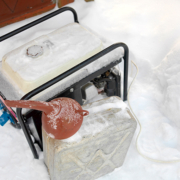All The Tips You Need For Your Winter Generator
Winter is coming and weather forecasts are already predicting icy winds as well as heavy blankets of snow. The worst of the weather can cause various issues including the destruction of power lines. At that point, you will need to rely on your generator, but cold weather can cause problems here as well. So, you have to be prepared. Cold weather can:
- Cause batteries to slow down
- Oil to thicken
- Parts to move slower
Each issue can put the engine under more strain and mean it won’t provide the solution you need. As such, you need to make sure that you are maintaining your generator correctly, guaranteeing that it works effectively when the worst of the weather hits. Here are the best tips and solutions.
Keep A Check On Your Maintenance Schedule
It’s likely that you are maintaining your generator on a schedule. If that is the case, do make sure that you bring the maintenance schedule forward before the winter weather hits. You should do this now and make sure that all the smaller maintenance jobs are covered. This includes:
- Changing the oil filters,
- Checking spark plugs are working effectively,
- Checking the fluid levels,
- Make sure the batteries are operating.
Test Your Generator Is Working Effectively
If you want to make sure that your generator is working effectively, the best way is to get is tested. You need to make sure that there are no issues. Test your generator regularly through the winter months as this will ensure that it remains well lubricated. As well as checking the operations of the equipment inside the system, do make sure that you are checking:
- The control panels for digital systems – Cold weather can cause issue with the control panels and mean that they will not turn on when you need them most.
- The block heater – You need to make sure that this is functioning fully when plugged in. Without this, the liquid in the generator will not remain warm, and the machine may not work at all.
- The battery charger – if you schedule a call out for a service of your generator, it will likely be an issue with the battery charger. Make sure it is connected to stop the generator losing power due to icy temperatures.
Winterize The Generator
You should make sure that you are winterizing your generator. This means that the generator will be prepared for the winter weather through modifications. There are a few ways to do this:
- Change the fuel – anti-microbial and anti-gel additives should winterize fuel.
- Prepare your radiator – make sure that you are adding a suitable coolant mixture to your generator radiator.
- Cold weather kit – do consider using a cold weather kit if your property is in a location where the temperature could fall below 40 degrees. A cold weather kit will ensure that vital parts of the engine remain warm and will start when you need them to.
Managing Your Fuel
Emergency generators for your business will require fuel. When running, you may have to add more fuel every day, two days or three days, depending on the size of the generator you are using. While you can manage this yourself, you might want to think about outsourcing to a fuel management company instead. This is a smart idea because:
- Bad weather can cause a state of emergency where fuel levels are low – management teams can get the fuel you need.
- Bad weather can also mean it is difficult to reach and refuel your generator – a management team will have the tools and vehicles necessary for this type of job and will never leave your business stuck in the cold.
Take A Look At Your Generator As Often As You Can
How much time do you spend adding fuel to your generator? You probably want to complete a maintenance job like this as quickly as possible. Particularly, if the temperature has dropped below zero outside. But, you should be taking the time to visually inspect your generator and make sure that there are not issues that need to be rectified. You should be looking out for common issues such as:
- Areas by the generator that are covered with debris – Remember, when the winter weather arrives, debris like this can damage or disrupt your generator and stop it from functioning effectively.
- You need to watch out for any leaks and check for stains or puddles that could be a sign of this issue. If you notice a leak, try to find the source so it can be repaired quickly.
We hope this helps you keep your generator operating well, making sure that your business stays warm and powered through the winter months.
If you think you need more information or our guidance and assistance, please contact us right away, so that our professionals can help you before winter arrives.







